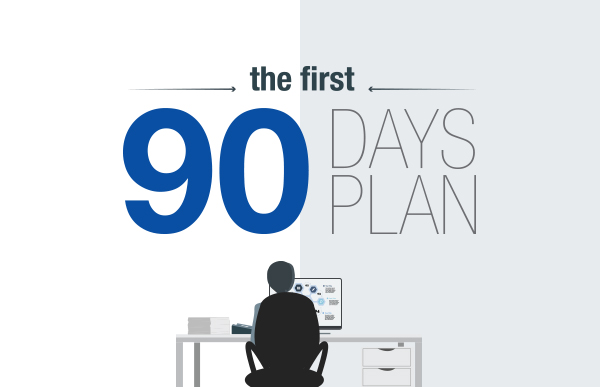The First 90 Days – Part 1: Preparation Through to Quick Wins
Intro
How you conduct yourself in the first few months of a new role is critical. This period can have a huge impact not only on how successful you are in settling in, but also on your long-term success.
Managing the balance between delivering in the role quickly, to prove the merit of your hire, against long term strategic decisions can be a challenge, especially the more senior the position is. Knowing who to ask, what to ask and when, without communicating an image of uncertainty and weakness is vital.
The early months in a new role are going to be incredibly important and with so much new information coming at you from different places, possibly at the same time, there is a danger of becoming overwhelmed. Research indicates that those who had a strategy and followed a plan had a smoother transition and felt more comfortable and in control than those who didn’t.
Using several reference sources including “First 90 Days” by Michael Watkins we have 10 tenets on how to manage your first 90 days in the role. So, to give yourself the greatest chance, here are our first 5 points along with some other thoughts to consider and build into your own plan.
- In Preparation
You may not have realised it, but you started the preparation work before your first interview. The time between being offered the role and starting is a great time to build on that early work.
A common mistake in this period is to focus on being seen as a good leaver with your current organisation, trying to leave everything perfect for the next person over and above focusing on the new role, this is especially the case when taking a new role within the same organisation.
So, in the weeks/months before you start, make sure that you are actively putting time aside to learn and understand as much as you can about:
- The role – where you are strong and where you might have some knowledge/skills gaps
- Your new bosses’ expectations
- How the role fits within the rest of the team
- How it relates to the company’s mission statement, vision and overall business strategy
- Your new customers and clients – internally and externally
- The overall company culture
- Accumulate Knowledge/ Learn Fast
Success in a new role with new responsibilities is not going to happen overnight. Recognise that initially, things may be more intense as you adjust to the new environment and there may be times when you need to put in more hours to get something finished etc. However, be mindful of the temptation to put in extra hours over and above what is needed for the sake of it, so that you maintain a sensible work life balance.
Listen and learn from everyone, not just your immediate colleagues. Whilst they will be great in getting you up to speed with regards to the role, talking and listening to others, from the person who says hello to you when you walk through the door to the last person you say goodbye to at the end of the day, can give you great and different insights into the company culture.
Be proactive and don’t just wait for things to happen. Take the initiative, if you find you have a gap in your diary, look to fill it by having a one-on-one conversation with a work colleague or sit in on a meeting; the more you know about how your role sits within the company, the better job you will be able to do in the long term.
Not everything has to be formal and have a work/task focus. Getting to know people over a cup of coffee or a bite to eat in a more relaxed environment is a great way to start building collaborative relationships, especially if you find you have something in common with them.
- Situational Awareness
Do not assume that simply replicating what worked for you before is necessarily going to work now. Take some time out to think through what any new strategy should be, factoring in your learning, performance and personal priorities against the new organisational, people and cultural variables.
Make sure you speak to the people concerned, get their insights on what works and what does not. It may be that you adopt their approach rather than forcing on them a new approach, especially in the early days.
Continually review your strategies and if new priorities come to light, before automatically adding it to your to do list, make sure that you have a conversation with your line manager to ensure that you are both focusing on the most important ones, not just the ones that are most recent.
- What Does Success Look Like?
One of the most important relationships is going to be the one between you and your boss, so in the early months, your boss does not have to understand you, but you have to understand your boss.
For this to work well and for you to be successful, take time out to understand their working preferences on things such as how they want to be contacted, how often and what kind of detail do they need or want in any communication. You need to know their priorities and what they are measured on, as one of your key goals is to make their job easier.
Managing their expectations is crucial if you want to be seen as reliable and trustworthy from the outset. While you may have your own way of prioritising tasks and activities, it is important that in terms of what you are doing, these are in alignment with theirs, so make sure that you have clarified how you will work together and how your job performance will be assessed, so ensure you set SMART goals: Specific, Measurable, Attainable, Realistic and Time-Bound.
- Quick Wins
Delivering on something early is a great way of reassuring everyone that you were the right appointment.
These early accomplishments do not have to be ground shaking, even small ones will indicate that you can make a positive impact in the role, allowing you to build your reputation and prove your worth with your boss and wider colleagues.
Being new, puts you in a unique position of seeing things through a different lens, so try and leverage this fresh perspective as early on to your advantage as a point of differentiation. If you are able to develop something, implement something or fix something in these early months you will gain credibility.
Do not let early successes blindside you, acknowledge what you have achieved, but do not let this affect your focus and determination. More importantly share the credit by acknowledging the parts others played as this will help you build collaborative relationships and gain early acceptance.

